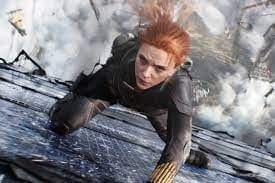Budapest With An S.H. (Review: Black Widow)
Black Widow is streaming on Disney+
Prequels are terrible. That is, until they aren’t. It used to be that the idea of checking out the earlier adventures of beloved characters was nothing more than a craven cash grab. You had the tomfoolery of Butch and Sundance: The Early Years, the nonsense of Hannibal Rising, and the blatant idiocy of X-Men Origins: Wolverine.
Done well, a prequel can add texture and character to a franchise. It can fill in the blanks and even recontextualize the original work. Despite the clunky execution, mostly poor acting, and thunderingly obvious storytelling, George Lucas deserves credit. His Prequel trilogy wasn’t motivated by money, since at that point Lucas had enough money to give Donald Trump an envy-related stroke. Lucas genuinely had things to say about the slow erosion of democracy and the slide of a good man into evil. He just didn’t say those things particularly well.
I have to give even more credit to Vince Gilligan and Peter Gould. After the creation of Breaking Bad, one of the most perfect television series ever to air, Gould and Gilligan decided that looking backward was the best way to look forward. To do that, they focused on Jimmy McGill, a mostly well-meaning lawyer with a worrying habit of cutting corners. Better Call Saul became a masterclass in character work, and we saw that the origins of scumbag extraordinaire Saul Goodman were based on choices, specifically choices relating to big events.
For a prequel to function, a franchise needs to understand its history, significant events, and how characters feel about them. The Marvel Cinematic Universe cares deeply about all of that. They have mined stories regarding the extra-dimensional invasion of New York, the destruction of the nation-state Sokovia by an insane robot, and the time when literally half of all living things winked out of existence. Oh yeah, and the time when The Avengers went through a very messy break-up. One of the OG Avengers was the Black Widow, the only woman on the team and nearly the only one not to have her own movie** That oversight has finally been corrected, and while Black Widow doesn’t represent the pinnacle of the MCU, it’s still a worthy installment.
 Before the Battle of Wakanda, before the coming of the Mad Titan, and before her lonely death on the remote planet of Vormir, Natasha Romanoff (Scarlett Johansson) found herself in a very familiar position. Yet again, she’s on the run. It seems to be how she’s always lived her life, and we see how it began during a seemingly idyllic childhood in Ohio. Young Natasha loves her sister Yelena, loves her scientific-minded mom Melina (Rachel Weisz), and loves her goofball dad Alexei (David Harbour).
Before the Battle of Wakanda, before the coming of the Mad Titan, and before her lonely death on the remote planet of Vormir, Natasha Romanoff (Scarlett Johansson) found herself in a very familiar position. Yet again, she’s on the run. It seems to be how she’s always lived her life, and we see how it began during a seemingly idyllic childhood in Ohio. Young Natasha loves her sister Yelena, loves her scientific-minded mom Melina (Rachel Weisz), and loves her goofball dad Alexei (David Harbour).
Only they aren’t a family, not exactly. Melina and Alexei are deep-cover Russian spies, and for three years they have been observing America. Then, their cover is blown. They get the heck out of Dodge and, making matters worse, Natasha and Yelena are unceremoniously yanked from their faux parents and dropped into the Red Room. It’s a way, way off the books training program where girls are chemically, psychologically, and physically programmed to become killing machines.
Time passes and grown-up Natasha thinks she’s whacked Dreykov (Ray Winstone), the architect of the Red Room.*** She has bigger problems considering that she violated the Sokovia Accords and has to go off the grid and plot her next move. That move is complicated when she gets her hands on a package from Yelena (Florence Pugh), all grown up and kicking people in the face. It turns out that enclosed within the package are mysterious chemicals that just might free the remaining Widows from their enforced slavery.
Being that she has nothing better to do, Natasha decides to reunite her faux family and take down the Widow program. Finding it is hard. Dealing with their operative Taskmaster, who has the ability to perfectly mimic an opponent’s skills, is harder. Most difficult of all will be Natasha having to deal with the people in her life that began as a fake family and might transform into a real one.
It’s an unfair criticism, but perhaps the largest flaw with Black Widow is that it should have been released years ago. Natasha Romanoff is one of the foundational characters in the MCU, and while I have nothing against 2019’s Captain Marvel, the Black Widow carries as much weight in the MCU as Wonder Woman does for DC. Numerous delays happened due to corporate foot-dragging and an unforeseen (or totally foreseen) global pandemic, and those delays do a great job of undercutting a lot of the suspense.
Still, it’s not the fault of the filmmakers. Director Cate Shortland has made a slick espionage thriller that nods to the lore of the MCU without getting stuck under its thumb. The action sequences are clean, crisp, and walk a fine line between the stripped-down mayhem of The Bourne Identity and the expensive-looking destruction the MCU is known for. Shortland knows that the real reason people keep coming back to these things is the characters. We like Natasha’s wry sarcasm and wary idealism, and we like to see how she bounces off the new and old people in her orbit. While the film occasionally gets a little too talky, I enjoyed Natasha talking more than I enjoyed her shooting some luckless shmoe.
The screenplay, by Eric Pearson, Jac Schaeffer, and Ned Benson does a few things wrong and one major thing nearly perfectly. There are essentially three intertwined threads of the story:
- Natasha must develop her own family
- Natasha must reckon with her past as an assassin
- Natasha must put an end to the Red Room.
The problem is, two of those three threads have been fairly extensively covered in other movies. Natasha makes The Avengers her family and loves  Clint Barton so much as an adopted brother that she throws herself off a cliff for him in Avengers: Endgame. She deals with her blood-red ledger in both The Avengers and in Captain America: The Winter Soldier. So why are we going over this well-trod ground again? For the third thread, Natasha puts an end to the Red Room twice in one movie, ending up in pretty much the same place she started.
Clint Barton so much as an adopted brother that she throws herself off a cliff for him in Avengers: Endgame. She deals with her blood-red ledger in both The Avengers and in Captain America: The Winter Soldier. So why are we going over this well-trod ground again? For the third thread, Natasha puts an end to the Red Room twice in one movie, ending up in pretty much the same place she started.
Back in the early days of the MCU, there was a fairly serious villain problem. The Abomination was little more than a rampaging monster. Malekith was a snooze. Ronan the Accuser was significantly less cool than you would expect someone named Ronan the Accuser to be. I figured, however, with layered antagonists like Killmonger, Thanos, and the Vulture, the MCU was putting the vanilla-flavored villains in the rear-view mirror. Apparently not. I like Ray Winstone quite a lot, but as General Dreykov, the creator of the Red Room, he’s given very little to do other than a monologue. Black Widow needed an antagonist to equal Natasha Romanoff. What it got was a bad guy who would feel right at home in a terrible Chuck Norris movie.
Having complained about all that, the screenplay does strong work by giving the actors meaty roles to dig into. I enjoyed the too brief appearance of Rachel Weisz and her equivocation over rejoining her not-really-a-family family. I enjoyed David Harbour’s meatheaded Alexei, a guy fully convinced that he’s Russia’s answer to Steve Rogers, except for the sizable gut and scary old man beard. The MVP of the cast is Florence Pugh’s Yelena Belova. She relentlessly mocks Natasha’s hair flip and combat poses, and underneath her snark is a very interesting concept. Deep down, her fake family was always real to her, and she’d love nothing more than for it to be knit back together. Pugh is an interesting and unpredictable actor, and she’s one of the most interesting additions to the MCU in a while.
From a character perspective, the screenplay is aces. Perhaps the main reason to pay hard-earned money to see Black Widow isn’t vehicular mayhem or Scarlett Johansson demolishing luckless goons. It’s a scene set at a dinner table in which four people talk, examine their shared history, and go over whether or not they’re really a family. While the MCU has gotten into the concept of a found family in a whole bunch of films, I think this is the first film to really drill down into what that actually means, and show the need some characters have for it and the discomfort others grapple with. The thing the MCU has always done better than any other franchise is the character work. They know we want to see likable and interesting people and how they bounce off each other.
Speaking of which, Scarlett Johansson holds the whole film together in a performance just as iconic as any of her co-stars in the MCU. Natasha Romanoff occupies an interesting place in the MCU. While Tony Stark bears guilt due to his past as a weapons manufacturer, he was always removed from the carnage he wrought. Steve Rogers killed, but always did so in service to ideals. Natasha has always been a bit different. She had blood on her hands, lots of it, and her character has a great deal of guilt to carry. Johansson allows us to subtly feel a little bit of that weight. Her performance is nimble, strong, slyly amusing, and like Robert Downey Jr. and Chris Evans, she’s never crushed by the franchise machinery around her.
I remember feeling a little irritated with the end of Avengers: Endgame, the fact that Tony Stark received an appropriately egomaniacal sendoff while the Black Widow got a cursory “Oh, yeah, she’s great, too” acknowledgment. Despite the lousy timing and problematic story elements, Black Widow remains a fitting sendoff for the shadowy Avenger. It’s an upper-tier entry in the MCU, and while it was a long time coming, it’s better late than never.

*For a minute there, 20th Century Fox was trying to get McClane off the ground. This was meant to be Die Hard: Year One, which I always thought was called Die Hard.
**There’s less than no chance of a Hawkeye movie, but there will be a series coming up on Disney+, so that’s something?
***Pro tip: if there’s no body, they’re not dead.





